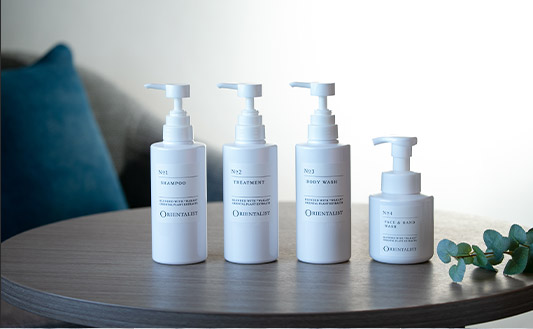预订

【全新开幕】The Oriental Floor重新开业
敬请在宽敞舒适的
空间享受悠闲时光。
全新装修最高2层客房
对最高层的99间客房(22~42㎡/5种房型)实施全新装修。
客房采用南法普罗旺斯地中海风格设计,墙面以蓝色为基调,
内装搭配高雅的金色,迎接宾客的入住。
同时,玄关处方便脱鞋,并配备足部按摩器,
设有支持投屏的电视机(49英寸或55英寸)、带有设计感的茶几与椅子,
兼具功能性布局的客房邀您乐享“舒适空间”与“悠闲时光”。
ROOMS客房介绍
The Oriental层所有客房均备有原创品牌日用品“ORIENTALIST”及
“ReFa”小气泡美肤花洒、吹风机、直板夹。
-

Type01
Oriental Deluxe
该高级客房采用南法普罗旺斯地中海风格设计,以蓝色为基调,搭配温暖的木质内装。
玄关处脱鞋后,尽享无比放松的“舒适空间”与“悠闲时光”。最大入住人数 4名 尺寸 42㎡ 床尺寸 宽120×3
宽100×1浴室 浴缸、洗漱区、手握式花洒 -

Type02
Oriental Superior
宽敞的空间配备支持投屏的55英寸电视机、足部按摩器,床头板备有智能手机充电处。
兼具功能性的布局,设有洗漱区的浴室适合长期入住。最大入住人数 4名 尺寸 32㎡ 床尺寸 宽120×2
宽100×1
宽90×1浴室 浴缸、洗漱区、手握式花洒 -

Type03
Oriental Comfort
该客房最多可供三人入住,设计典雅。
带洗漱区的浴室安装有水流舒适的“Refa”小气泡美肤花洒,您可自行调节水量。
适合与家人朋友一同入住。最大入住人数 3名 尺寸 25㎡ 床尺寸 宽110×2
宽100×1浴室 浴缸、洗漱区、手握式花洒 -

Type04
Oriental Moderate
该客房设有淋浴间,最多可供2人入住。
配备雨淋花洒,且备有含天然椰子清洗成分的无硅氨基酸洗发水“ORIENTALIST”。最大入住人数 2名 尺寸 25㎡ 床尺寸 宽120×2 浴室 淋浴间(雨淋花洒、手握式花洒) -

Type05
Oriental Standard
配备雨淋花洒,仿佛雨水柔和包裹全身,让您放松身心。
设有支持投屏的49英寸电视机、足部按摩器等,兼具功能性的精巧型客房。最大入住人数 2名 尺寸 22㎡ 床尺寸 宽120×2 浴室 淋浴间(雨淋花洒、手握式花洒)
酒店用品介绍
-

ORIENTALIST
添加日汉植物精华、温柔呵护肌肤的Oriental原创品牌日用品。
所有商品均添加5~6种日汉精华,生长在富饶自然中的日汉植物“温和”“滋润”头发与肌肤。 -

ReFa
The Oriental层所有客房均备有以脸部、身体、头发等美容家电为中心的美容品牌“Refa”的吹风机、直板夹、花洒。


















